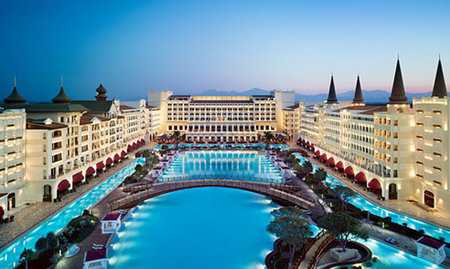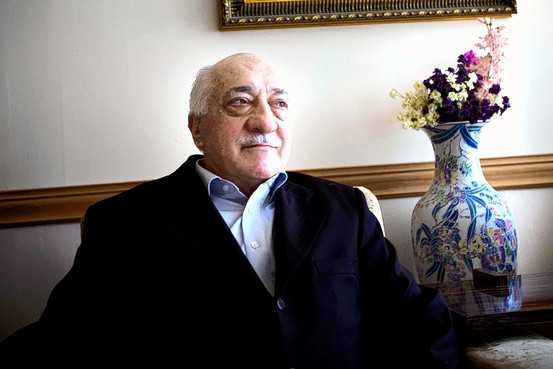 Turkey is on everyone’s holiday radar right now because it’s one of the few destinations where a pound might just buy more than a chip wrapper this summer.
Turkey is on everyone’s holiday radar right now because it’s one of the few destinations where a pound might just buy more than a chip wrapper this summer.
At least, that’s how most Brits are viewing the country. Turkey’s tourism chiefs see things somewhat differently. They are busy transforming a section of its southern seaboard into a European Dubai.
The object of their attentions is Antalya — an hour’s plane ride from Istanbul, down on a ragged cliff edge of the Mediterranean and piled high with the sort of bleak tower blocks that we spent the 1960s building and the 1980s bulldozing.
Granted, not the most promising launch pad for a razzmatazz resort, but then you need bifocal beer goggles to declare most of Dubai pretty, too. And Antalya is already home to several hotels that seem to rely more on steroids than star ratings.
There’s the Marmara, the world’s first revolving hotel; the Kremlin Palace, a lifesize replica of the Russian seat of government; and, in nearby Belek, the Adam & Eve, which claims to be the world’s sexiest hotel.
So far, so far out, but Antalya comes of high-kicking age (or toe-curling, depending on your disposition) in June, with the unveiling of the Mardan Palace. It will be Europe’s most expensive hotel, a billion-dollar baby (well, $1.4 billion, to be precise).
From the outside, it looks like Soviet Barbie’s wedding cake, with endless layers of white and gold. Inside, that Midas touch means more than 10,000 square metres of gold leaf, aided and abetted by 500,000 crystals and 23,000 square metres of Italian marble.
The pool is one of the largest in the Med: five acres of fresh water with a sunken aquarium stocked with 2,400 fish as its centrepiece. It is spanned by bridges based on designs by Leonardo da Vinci and has gondolas to take guests from one end to the other, a trip that takes half an hour (though the boats do move slowly).
There are musicians to serenade spa-goers into the traditional Turkish hammam, and in the waterside Italian restaurant, your little darling will be banging his spoon against a pasta bowl from a service by Hermès that cost £1.35m. In short, the owner will be absolutely furious if he hasn’t spent as much money as is humanly possible.
He being first-time hotelier Telman Ismailov, president of the Russian group AST, and a man not known to stint. In 2006, he reportedly paid Jennifer Lopez £1m to sing Happy Birthday to him at a party for his 50th. Ismailov pointed his private jet (naturally, it’s painted gold) in the direction of Antalya to holiday so often that his butler remarked it would make better financial sense to build rather than continue renting villas. He might have been right if Ismailov had restricted himself to, say, five or six bedrooms instead of 560.
But the gondoliers? The crystals? The gold? It all sounds incredibly tacky, doesn’t it? Some of it is. The laser shows and fountain displays are very Vegas, the pole-dancing platforms in its three-storey nightclub may prove a tad too Moscow for most, and the private spa suite, which is accessed through a waterfall and costs £1,500 an hour to rent, has a hideous champagne bar that is 100% cupid corny.
Other aspects are downright offensive: the fur coats in its version of Istanbul’s famous Grand Bazaar; the toothless sharks in its swim reef; and the 9,000 tons of sand dredged from Egypt to ensure the private beach is silky soft.
But there are also areas that, while jaw-droppingly lavish, are really quite beautiful. The lobby, for example, may be almost the size of a football pitch but it wears those vast proportions with a serene elegance. It has been based on Istanbul’s 19th-century Dolmabahce Palace, which was built as the last hurrah of the sultans.
There are wonderful baroque, rococo and neoclassical influences amid its Ottoman indulgences.
The concept is that, like Istanbul, the hotel provides a bridge between Europe and Asia. The lobby and the Dolmabahce bedrooms represent the Ottoman empire, off to one side is the European wing, to the other, the Anatolian. Each is decorated in keeping, so the Ottoman bedrooms are the most ornate — lots of mahogany, dark reds and intricate fittings.
The European rooms are crisp and contemporary, and the Anatolian wing is moodier, with walnut, gold and lashings of lush velvet. There are suites, of course, with the usual ridiculous price tags (up to £13,000 a night), and completely unnecessary facilities, including huge £45,000 TVs, grand pianos and private pools, but they do have glorious views over the Taurus Mountains… and The Kremlin (the neighbouring hotel).
And it’s the first time I’ve come across remote controls for the lavatories.
Although it won’t open until June 1, the hotel has been in practice mode for months. I visited with eight weeks to go and operations were impressively smooth. The staff don’t have the white-gloved prissiness of the Burj al Arab or the robotic tendencies of that other billion-dollar extravaganza, the Emirates Palace in Abu Dhabi, where I was constantly wished a “Majestic Palace Experience”.
At Mardan, they look you in the eye and smile and speak like real people. It is not particularly polished, but a more informal approach seems appropriate for a beach resort.
There are 10 restaurants, from sleek Japanese to swanky Russian, headed by Michelin-trained chefs from the country of the cuisine’s origin. I tried the Thai, Italian, Turkish and seafood and found the dishes consistently very good and generally well priced (with mains between £10 and £13).
One note of caution: Turkey might be cheap, wine in Turkey is not. A glass of champagne costs a gobsmacking £36.50 and you won’t get a bottle of vino for under £30. Blame it on the 250% import taxes and the fact that Turkish customs withhold six bottles of every vintage for “testing”.
As the Mardan’s wine cellar contains Château Lafite Rothschild 1996 retailing at £2,120 a bottle, that means some Turkish official somewhere probably woke up one day with one hell of an expensive hangover.
If you like to conjugate Latin verbs in your free time, this probably isn’t the place for you, but if you secretly enjoy a bit of wanton excess on holiday — or are happy to turn a blind eye to it — bling Antalya-style is considerably cheaper than the Dubai version, and a couple of hours closer to home, too.
Timesonline
Hotel website: www.mardanpalace.com





